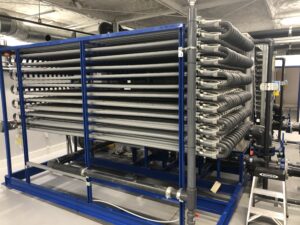Ultrafiltration Membrane System
Automotive connectors manufacturer of quick connectors for transfer of engine oil cooling fluids was in need of a wastewater treatment system to address oil and grease and heavy metal contaminants in their discharge. Based on understanding of the waste stream and ability to provide a cost effective solution, Dynatec was selected to provide a system that would produce effluent that reliably met the sewer discharge requirements. By using a combination of free oil separation and an ultrafiltration membrane system, in addition to removing all of the suspended solids, the Dynatec supplied system consistently provides effluent meeting discharge requirements.
Automotive Connectors Manufacturer Contaminants removed:
- Biochemical oxygen demand (BOD)
- Oil/grease
- Suspended solids
- Chemical oxygen demand (COD)
- Zinc
- Chrome
Dynatec Systems industry-leading tubular ultrafiltration (UF) system is used to treat a broad range of industrial wastewater by separating insoluble components from waste streams. As a cost effective and simple solution for separating insoluble components and colloidal contaminants from a waste stream, wastewater UF offers significant advantages over conventional separation. It is a useful process that does not require chemicals or much space to separate insoluble contaminants.
UF is a pressure-driven process that removes the following from wastewater and other solutions:
- Emulsified oils
- Metal hydroxides
- Colloids
- Emulsions
- Dispersed material
- Suspended solids
- Other large molecular-weight materials
Ultrafiltration systems are also capable of concentrating:
- Bacteria
- Some proteins
- Some dyes
- Colloidal or emulsified components
Ultrafiltration systems excels at the clarification of solutions containing:
- Suspended solids
- Bacteria
- High concentrations of macromolecules including:
- Oil and water
- Fruit juice
- Milk
- Whey
- Electro-coat paints
- Pharmaceuticals
- Poly-vinyl alcohol and indigo
- Potable water
- Tertiary wastewater
Ultrafiltration offers the following advantages over conventional separation:
- No chemical required
- Very little labor required
- Simple mechanical process
- Less sludge
- Ability to concentrate the retentate for beneficial use
- Less space required
- Overall lower operating costs
Tubular Configuration:
- Higher permeate rate
- Lower rates of fouling
- Higher concentration of retentate
- Easier to clean
- Longer membrane life
- Low operating cost
For more information on wastewater treatment systems to address oil and grease and heavy metal contaminants, please contact us today.
